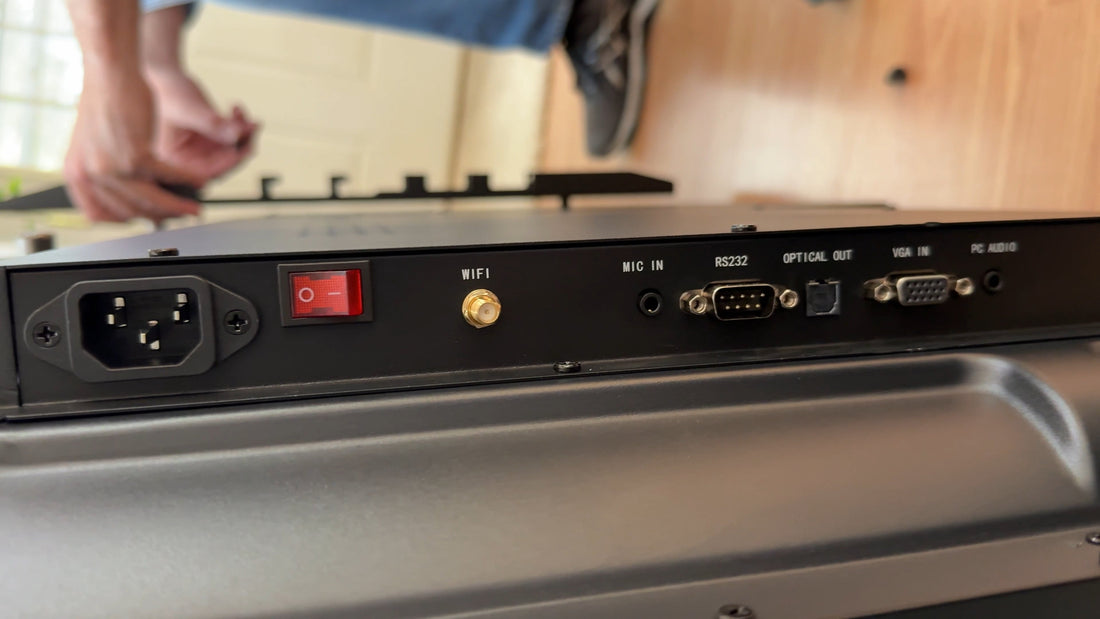
HKMLC Smart Boards are versatile devices that can be set up in a variety of environments, with many available methods of connection. Knowing which cables to use will help you choose between high-quality display, active touch support, or compatibility with legacy devices. In this guide, we break down the differences between these connection types and provide tips for choosing the right one for your needs.

Before you settle on a cable, it is important to understand the primary functions of the different types:
HDMI (High-Definition Multimedia Interface): High-quality audio and video transfer.
USB (Universal Serial Bus): For transferring data to and from the Smart Board as well as interactive touch between the Smart Board and a computer.
Monitor assembly - VGA (Video Graphics Array): An older standard for video transmission, used mainly with legacy devices.
Each of these has its pros and cons which fit different use cases.
HKMLC Smart Board inputs and ports To understand what connection options the HKMLC Smart Board will work with, it is important to double-check which outputs are available on your device as well as your computer before deciding. Newer models tend to prioritize HDMI and USB, while older systems may still cling to VGA.
Tip: Make sure to verify the input and output ports on your computer and Smart Board to be sure that you get the correct cables before buying.
|
Connection Type |
Video Quality |
Audio Support |
Touch Functionality |
Compatibility |
|
HDMI |
High-Definition (4K) |
Yes |
No (requires USB for touch) |
Modern devices |
|
USB |
Not for video |
No |
Yes |
Touch-enabled Smart Boards |
|
VGA |
Lower resolution (1080p max) |
No |
No |
Older devices |
For those that care greatly about both video and audio quality, stick with HDMI. Nevertheless, if the touch function is also necessary, USB should also be plugged in. VGA is basically one of those interfaces still on desktop monitors, but it has become outdated except that it is widely used only when HDMI is not available.
Using HDMI for Your Connection (Ideal for Display Integrity)
Insert the HDMI cable into the Smart Board HDMI input
Plug the opposite end into the HDMI output port on your computer or device.
Make sure the correct input source is selected on Smart Board to mirror the screen.
✔ Best for: High-definition image quality, audio support, and new systems.
On the computer, plug a USB cable from the Smart Board
Make sure any required drivers/software are installed for touch function.
Verify the touch input by checking if it works.
✔ Best for: Adding interactive touch capabilities (when used in conjunction with HDMI)
Plug in the VGA cable to the Smart Board and computer.
(If you want audio — VGA doesn’t carry sound — you’ll need a separate cable.)
For improved screen quality, change to the proper resolution in settings.
✔ Best for: Legacy systems that lack HDMI.
Your HKMLC Smart Board isn’t displaying, or touch doesn’t seem to work.
✅ HDMI Issues: Make sure the Smart Board source you are connecting to is the correct input.
✅ For USB Touch Issues: Make sure that drivers/software are installed.
✅ For VGA Issues: On your computer, check the resolution settings.
If you continue to experience issues, please consult the HKMLC Smart Board user manual or contact technical support.
For keeping a clean setup, you can have cable management solutions like:
Twist ties or other cable organizers
Wireless replacements (if any exist)
Preventing disconnections by correctly securing cables
A better-managed connection system ensures that the connections are managed efficiently, minimizing the chances of accidental disconnections.

To get the best experience from your HKMLC Smart Board:
Help sound systems or receivers with HDMI output
Related posts:USB for touchWWBP for touch Power Bank Touch功能USB Touch Power BankTouch power bank
Only use VGA when HDMI is not an alternative
Imagine all that time spent at conferences, lectures, business meetings, and presentations that get disrupted by faulty cables and projector connections. Even if your Smart Board sounds perfect, if it cannot connect to your devices seamlessly, you will never get to experience its unique capabilities.
Upgrade your setup today! Check out the latest models and accessories of HKMLC Smart Board.
No comments
0 comments